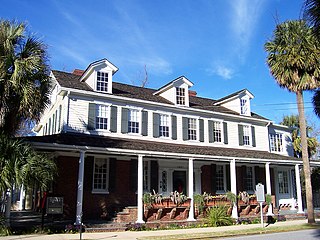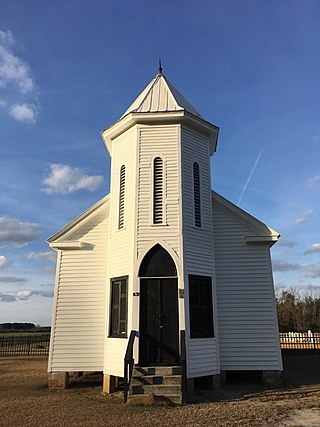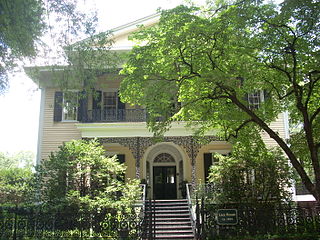
Blythewood is a town in Richland and Fairfield counties, South Carolina, United States. It is a suburb of Columbia, South Carolina. The 2020 United States census puts the population at 4,772. It is part of the Columbia, South Carolina, Metropolitan Statistical Area. It is located around 15 miles from downtown Columbia.
Woodlands may back-refer to:

The Old Campus District, University of South Carolina, is a historic district centered on The Horseshoe on the main campus of the University of South Carolina in Columbia, South Carolina. On June 5, 1970, it was listed in the National Register of Historic Places. On April 19, 1996 MTV Unplugged filmed Hootie & the Blowfish's concert on The Horseshoe before the release of their second album Fairweather Johnson.

The Robert Mills House, also known as Robert Mills Historic House and Park or the Ainsley Hall House, is a historic house museum at 1616 Blanding Street in Columbia, South Carolina. Built in 1823 to a design by Robert Mills, it was designated a National Historic Landmark in 1973 for its architectural significance. The Historic Columbia Foundation owns and operates the home, which has been furnished with decorative arts of the early 19th century, including American Federal, English Regency, and French Empire pieces.

This is a list of the National Register of Historic Places listings in Richland County, South Carolina.
Barber House is a historic house located in Hopkins, South Carolina. It was built in 1880 and is significant for its architecture. It was added to the National Register of Historic Places in 1986.
Hoffman House, Hoffman Barn, or Hoffman Hotel may refer to:

The Hale–Elmore–Seibels House or Seibels House is a historic building located in Columbia, South Carolina. Records of the exact year of its construction were destroyed in 1865 during the burning of the city by Union soldiers serving under General William Tecumseh Sherman. The best guess for the date of construction stems from a purported "1796" carved into a beam in the basement. Much of the early history of the house is uncertain, but it is thought to be the oldest building in Columbia.

C.P. Quattlebaum House is a historic home located at Conway in Horry County, South Carolina. It was built in 1807. It is a two-story, "T"-plan, cross-gable roofed, frame, weatherboard-clad residence. It features a two-story, projecting, polygonal bay and two-tiered wrap around porch with sawn brackets. Its owner, Cephas Perry Quattlebaum, served as Conway's first mayor and his office is located nearby, the C.P. Quattlebaum Office.

Richland Presbyterian Church is a historic Presbyterian church located near Gadsden, Richland County, South Carolina. It was built in 1840 and is a one-story, rectangular meeting house form frame church with an octagonal entrance tower. The building remained in use until 1922.
Goodwill Plantation is a historic plantation and national historic district located near Eastover, Richland County, South Carolina. The district encompasses 10 contributing buildings and two contributing structures. They include the millpond and a portion of the canal irrigation system ; the overseer's house ; the 2-1/2-story frame mill building ; two slave cabins ; a blacksmith shop; the late-19th century main house; a lodge ; and a carriage house, tenant house, barn and corn crib.

John J. Kaminer House is a historic home located at Gadsden, Richland County, South Carolina. It was built about 1880, and is a 1 1/2-half-story, five-bay, frame cottage with a one-story rear ell. It is sheathed in weatherboard and has a gable roof with dormers. It features a shed-roofed front porch with cast-iron porch balusters.
Magnolia, now known as Wavering Place also previously known as the Francis Tucker Hopkins House, is a historic plantation house located near Gadsden, Richland County, South Carolina. It was built about 1855, and is a two-story, Greek Revival style frame building with a full stuccoed brick basement and weatherboard siding. The front facade features a portico with columns rest on tall stuccoed pedestals. Also on the property are a brick kitchen/office, a frame smokehouse and two one-story frame slave houses.
Oakwood, also known as Trumble Cottage, is a historic plantation house located near Gadsden, Richland County, South Carolina. It was built in 1877, and is a 1+1⁄2-story, vernacular Victorian frame cottage with Queen Anne style details. The front façade features a one-story porch with scroll-sawn brackets and a highly ornamented gabled dormer. Also on the property are two slave cabins, a double pen log barn, a corn crib, a frame well house, and another storage building.

J.A. Byrd Mercantile Store, also known as Nelson-Frazier Furniture, is a historic commercial building located at Eastover, Richland County, South Carolina. It was built about 1910, and is a two-story, three-bay, brick building. The front façade is faced with blond brick, marble, and cast stone. The first-floor has a three-bay arcade and the second story has three tall arched windows.

Lace House, also known as the Robertson House, is a historic home located at Columbia, South Carolina. It was built in 1854, and is a two-story, five-bay, frame dwelling on an English basement. It features a two-story, projecting front porch with ornate cast iron porch supports, and lace-like railings and trim.

Caldwell–Hampton–Boylston House is a historic home located at Columbia, South Carolina. It was built between 1820 and 1830, and is a three-story, five-bay, clapboard clad frame dwelling in the Greek Revival style. It features a two-story, projecting front porch. Also on the property is contributing ironwork and brick fencing, and a stable/carriage house, garden gazebo, and tea house. In 1874–1876, it was the residence of South Carolina Reconstruction governor Daniel H. Chamberlain, who purchased the house in 1869.

Debruhl-Marshall House is a historic home located in Columbia, South Carolina. It was built in 1820, and is a two-story, five-bay, brick Greek Revival style dwelling. It has a gabled slate roof and full basement. The front facade features a three-bay portico supported by four massive Doric order columns.
Keziah Goodwyn Hopkins Brevard House, also known as Alwehav, is a historic plantation house located in rural Richland County, South Carolina, near Eastover. The original house was built about 1820, and enlarged to its present size about 1850. It is a large, two-story, vernacular Greek Revival style residence with Italianate features. Also on the property are the remnants of a water tower, a frame stable, a barn, three frame sheds, a well, and four modern shed buildings. The property also has a number of unique horticultural specimens.
Laurelwood is a historic plantation house located in rural Richland County, South Carolina, near the city of Eastover. It was built about 1830, and is a two-story frame dwelling with a central-hall, double-pile plan. The front façade features a two-tier, three bay, pedimented portico in the Greek Revival style. It has a one-story, frame addition built in the early-20th century. Also on the property are the contributing frame smokehouse and a frame barn. Also notable is the survival of a slave quarters.
















